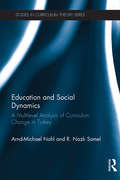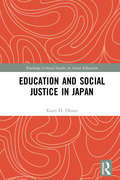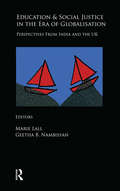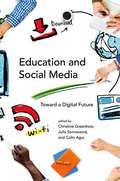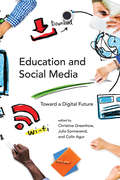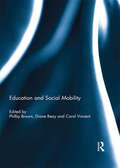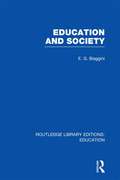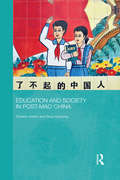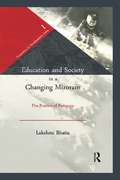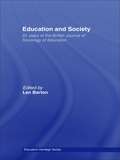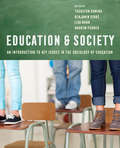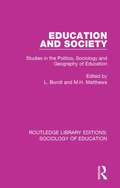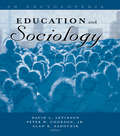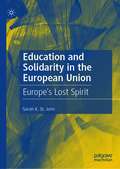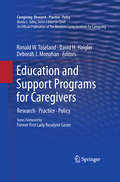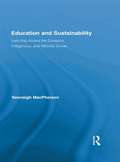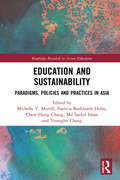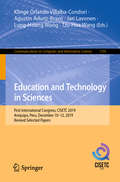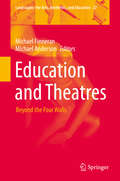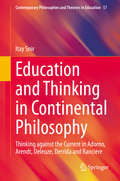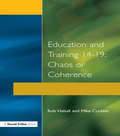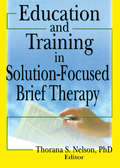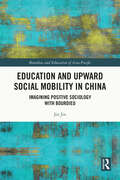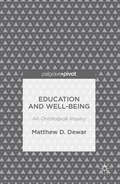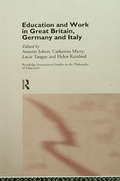- Table View
- List View
Education and Social Dynamics: A Multilevel Analysis of Curriculum Change in Turkey (Studies in Curriculum Theory Series)
by Arnd-Michael Nohl R. Nazlı SomelEducation and Social Dynamics offers a new approach to analyzing curriculum change by investigating the entanglement of education and society in markedly heterogeneous Turkey, which has recently witnessed nation-wide curriculum reforms. While the new curriculum has attempted to homogenize all Turkish primary schools since 2005, Nohl and Somel, drawing on a theoretical differentiation of social entities, reveal how subsequent curricular practices have had to account for the diversity of milieus and organizations in the nation’s educational sector, and how inequality and competition run rampant in the standardization efforts. Using expert interviews, group discussions, and other empirical data that compare instructional practices within five distinct schools, the book represents a breakthrough in our understanding of developments in Turkey and their significance for extant theories of curriculum development and reform worldwide. By linking specific case study material from Turkey to intensifying international concerns, it provides an important and relevant global commentary.
Education and Social Justice in Japan (Routledge Critical Studies in Asian Education)
by Kaori H. OkanoThis book is an up-to-date critical examination of schooling in Japan by an expert in this field. It focuses on developments in the last two decades, with a particular interest in social justice. Japan has experienced slow economic growth, changed employment practices, population decline, an aging society, and an increasingly multi-ethnic population resulting from migration. It has faced a call to respond to the rhetoric of globalization and to concerns in childhood poverty in the perceived affluence. In education we have seen developments responding to these challenges in national and local educational policies, as well as in school-level practices. What are the most significant developments in schooling of the last two decades? Why have these developments emerged, and how will they affect youth and society as a whole? How can we best interpret social justice implications of these developments in terms of both distributive justice and the politics of difference? To what extent have the shifts advanced the interests of disadvantaged groups? This book shows that, compared to three decades ago, the system of education increasingly acknowledges the need to address student diversity of all kinds, and delivers options that are more varied and flexible. But interest in social justice in education has tended to centre on the distribution of education (who gets how much of schooling), with fewer questions raised about the content of schooling that continues to advantage the already advantaged. Written in a highly accessible style, and aimed at scholars and students in the fields of comparative education, sociology of education and Japanese studies, this book illuminates changing policies and cumulative adjustments in the daily practice of schooling, as well as how various groups in society make sense of these changes.
Education and Social Justice in the Era of Globalisation: Perspectives from India and the UK
by Marie Lall; Geetha B. NambissanThe book discusses the implications of globalization on education from the perspective of social justice. It looks at two countries — India and the UK — to look at how global economic and cultural processes are mediated through nation states, institutional structures and the aspirations of different social groups. It seeks to resituate the debates around education and social justice in policy, research and public discourse by highlighting the need for a more nuanced understanding of globalization and education. It also demonstrates the effects of economic dimensions — the politics of neoliberalism, and how this has shifted the understanding of state responsibilities and marginalized issues pertaining to the agenda of social justice.
Education and Social Media: Toward a Digital Future
by Colin Agur Christine Greenhow Julia SonnevendHow are widely popular social media such as Facebook, Twitter, and Instagram transforming how teachers teach, how kids learn, and the very foundations of education? What controversies surround the integration of social media in students' lives? The past decade has brought increased access to new media, and with this new opportunities and challenges for education. In this book, leading scholars from education, law, communications, sociology, and cultural studies explore the digital transformation now taking place in a variety of educational contexts. The contributors examine such topics as social media usage in schools, online youth communities, and distance learning in developing countries; the disruption of existing educational models of how knowledge is created and shared; privacy; accreditation; and the tension between the new ease of sharing and copyright laws. Case studies examine teaching media in K--12 schools and at universities; tuition-free, open education powered by social media, as practiced by the University of the People; new financial models for higher education; the benefits and challenges of MOOCS (Massive Open Online Courses); social media and teacher education; and the civic and individual advantages of teens' participatory play.ContributorsColin Agur, Jack M. Balkin, Valerie Belair-Gagnon, danah boyd, Nicholas Bramble, David Buckingham, Chris Dede, Benjamin Gleason, Christine Greenhow, Daniel J. H. Greenwood, Jiahang Li, Yite John Lu, Minhtuyen Mai, John Palfrey, Ri Pierce-Grove, Adam Poppe, Shai Reshef, Julia Sonnevend, Mark Warschauer
Education and Social Media: Toward a Digital Future (The John D. and Catherine T. MacArthur Foundation Series on Digital Media and Learning)
by Colin Agur Christine Greenhow Julia SonnevendLeading scholars from a variety of disciplines explore the future of education, including social media usage, new norms of knowledge, privacy, copyright, and MOOCs.How are widely popular social media such as Facebook, Twitter, and Instagram transforming how teachers teach, how kids learn, and the very foundations of education? What controversies surround the integration of social media in students' lives? The past decade has brought increased access to new media, and with this new opportunities and challenges for education. In this book, leading scholars from education, law, communications, sociology, and cultural studies explore the digital transformation now taking place in a variety of educational contexts. The contributors examine such topics as social media usage in schools, online youth communities, and distance learning in developing countries; the disruption of existing educational models of how knowledge is created and shared; privacy; accreditation; and the tension between the new ease of sharing and copyright laws. Case studies examine teaching media in K–12 schools and at universities; tuition-free, open education powered by social media, as practiced by the University of the People; new financial models for higher education; the benefits and challenges of MOOCS (Massive Open Online Courses); social media and teacher education; and the civic and individual advantages of teens' participatory play.ContributorsColin Agur, Jack M. Balkin, Valerie Belair-Gagnon, danah boyd, Nicholas Bramble, David Buckingham, Chris Dede, Benjamin Gleason, Christine Greenhow, Daniel J. H. Greenwood, Jiahang Li, Yite John Lu, Minhtuyen Mai, John Palfrey, Ri Pierce-Grove, Adam Poppe, Shai Reshef, Julia Sonnevend, Mark Warschauer
Education and Social Mobility
by Phillip Brown, Diane Reay and Carol VincentThe study of education and social mobility has been a key area of sociological research since the 1950s. The importance of this research derives from the systematic analysis of functionalist theories of industrialism. Functionalist theories assume that the complementary demands of efficiency and justice result in more ‘meritocratic’ societies, characterized by high rates of social mobility. Much of the sociological evidence has cast doubt on this optimistic, if not utopian, claim that reform of the education system could eliminate the influence of class, gender and ethnicity on academic performance and occupational destinations.This book brings together sixteen cutting-edge articles on education and social mobility. It also includes an introductory essay offering a guide to the main issues and controversies addressed by authors from several countries. This comprehensive volume makes an important contribution to our theoretical and empirical understanding of the changing relationship between origins, education and destinations. This timely collection is also relevant to policy-makers as education and social mobility are firmly back on both national and global political agendas, viewed as key to creating fairer societies and more competitive economies.This book was originally published as a special issue of the British Journal of Sociology of Education.
Education and Society (Routledge Library Editions: Education #166)
by E. G. BiagginiThis volume discusses how the lay-person responds to written appeals to his intelligence and feelings with particular emphasis on education and culture. The author indicates a possible approach to the task of investigation rather than all that can be done with the method employed. The second part deals with educational questions relevant to the evidence and examines the social implications of this evidence.
Education and Society in Post-Mao China (Routledge Studies in Education and Society in Asia)
by Edward Vickers Zeng XiaodongThe post-Mao period has witnessed rapid social and economic transformation in all walks of Chinese life – much of it fuelled by, or reflected in, changes to the country’s education system. This book analyses the development of that system since the abandonment of radical Maoism and the inauguration of ‘Reform and Opening’ in the late 1970s. The principal focus is on formal education in schools and conventional institutions of tertiary education, but there is also some discussion of preschools, vocational training, and learning in non-formal contexts. The book begins with a discussion of the historical and comparative context for evaluating China’s educational ‘achievements’, followed by an extensive discussion of the key transitions in education policymaking during the ‘Reform and Opening’ period. This informs the subsequent examination of changes affecting the different phases of education from preschool to tertiary level. There are also chapters dealing specifically with the financing and administration of schooling, curriculum development, the public examinations system, the teaching profession, the phenomenon of marketisation, and the ‘international dimension’ of Chinese education. The book concludes with an assessment of the social consequences of educational change in the post-Mao era and a critical discussion of the recent fashion in certain Western countries for hailing China as an educational model. The analysis is supported by a wealth of sources – primary and secondary, textual and statistical – and is informed by both authors’ wide-ranging experience of Chinese education. As the first monograph on China's educational development during the forty years of the post-Mao era, this book will be essential reading for all those seeking to understand the world’s largest education system. It will also be crucial reference for educational comparativists, and for scholars from various disciplinary backgrounds researching contemporary Chinese society.
Education and Society in a Changing Mizoram: The Practice of Pedagogy (Transition in Northeastern India)
by Lakshmi BhatiaLocated in the domain of cultural politics, the book with rich ethnographical data from Mizoram, a lesser known and understood state, brings the community, state and culture to centre-stage, along with family and stratification of the sociological discourse in education. The book argues for a re-look at school education in Mizoram, besides providing critical insights into the North East region as a whole. It also points to the dilemmas of development in that region and suggests possible ways out of the impasse. Marking a significant departure from conventional thinking on education as 'human capital' as reflected in North-East Vision: 2020, the book strongly advocates the need for critical pedagogies based on learning from conflict; inculcating the values of tolerance and compassion as a precursor to peace; reconceptualising `development, not merely as 'economic' but as indicator of national happiness and valuing lives equally besides respect for traditional institutions, thus marking a break from the much resented paternalism that underpins all state interventions in education. One of the first studies of its kind regarding experience and practice of education, the book makes an important contribution to the role that education can play to usher in peace and promote respect for differences.
Education and Society: 25 Years of the British Journal of Sociology of Education (Education Heritage)
by Len BartonThe British Journal of Sociology of Education has established itself as the leading discipline-based publication. This collection of selected articles published since the first issue provides the reader with an informed insight and understanding of the nature, range and value of sociological thinking, its development over the last twenty-five years as well as the analysis of the relationship between society and education. Divided into four sections, the book covers: social theory and education social inequality and education sociology of institutions, curriculum and pedagogy research practices in the sociology of education. The intention of this form of organisation is to provide the reader with an awareness and understanding of multiple perspectives within the discipline as well as key conceptual, theoretical and empirical material, including a wealth of insights, ideas and questions. The editor’s specially written introduction to each section contextualises the selection and introduces readers to the main issues and current thinking in the field.
Education and Society: An Introduction to Key Issues in the Sociology of Education
by Thurston Domina Benjamin G. Gibbs Lisa Nunn Andrew PennerDrawing on current scholarship, Education and Society takes students on a journey through the many roles that education plays in contemporary societies. Addressing students’ own experience of education before expanding to larger sociological conversations, Education and Society helps readers understand and engage with such topics as peer groups, gender and identity, social class, the racialization of achievement, the treatment of immigrant children, special education, school choice, accountability, discipline, global perspectives, and schooling as a social institution. The book prompts students to evaluate how schools organize our society and how society organizes our schools. Moving from students to schooling to social forces, Education and Society provides a lively and engaging introduction to theory and research and will serve as a cornerstone for courses such as sociology of education, foundations of education, critical issues in education, and school and society.
Education and Society: Studies in the Politics, Sociology and Geography of Education (Routledge Library Editions: Sociology of Education #9)
by L. Bondi M. H. MatthewsThis book, first published in 1988, examines the most contentious issues in contemporary education. The political, social, educational and geographical impact of changes in the provision of educational services are discussed and illustrated through a wide range of case studies. Issues are examined from a number of different perspectives, amongst them those of the parent, the educational administrator and the organisational theorist, with the result that eh book is able to evaluate which changes are most consistent with the requirements of each group. This book will be of interest to students of sociology and education.
Education and Sociology: An Encyclopedia
by Peter W. Cookson Alan R. Sadovnik David L. LevinsonFirst Published in 2002. This single-volume reference provides readers and researchers with access to details on a wide range of topics and issues in the sociology of education. Entries cover both national and international perspectives and studies, as well as tackling controversial points in education today, including gender inequality, globalization, minorities, meritocracy, and more. This is a key, one-of-a-kind resource for all educational researchers and educators.
Education and Solidarity in the European Union: Europe’s Lost Spirit
by Sarah K. St. JohnThis book tells the story of the European Movement’s mission to create—through education—a European spirit in order to secure the success of European integration. This book draws links between the crisis of solidarity experienced by the European Union today and the difficulties faced throughout European integration to develop a fully-fledged EU education policy. It makes the case that education has not been a stable mechanism for fostering spirit due to its national attachment to identity and nation-building. Without education, it has been difficult to foster the spirit needed to establish a strong citizen-wide sense of European solidarity to overcome the crises the EU faces today. Exploring the connection between education and solidarity through the notion of spirit, the book presents an interdisciplinary study that avoids the compartmentalisation of education studies, philosophy and political science to bring ideas together that shed fresh light on contemporary debates currently under the spotlight.
Education and Support Programs for Caregivers
by Deborah J. Monahan David H. Haigler Ronald W. ToselandFor many, caring for a chronically ill family member is "the right thing to do", but it is also often a source of emotional hardship, physical stress, and social isolation. In response, skill-building, coping, and psychoeducational programs have emerged to help caregivers meet the changes and challenges in their - as well as the patients' - lives. Education and Support Programs for Caregivers reveals the diversity of the caregiver population as well as their experiences and needs, and it introduces an empirically solid framework for planning, implementing, and evaluating caregiver programs. The book synthesizes current trends, exploring the effectiveness of different types of programs (e.g., clinic, community, home based) and groups (e.g., peer, professional, self-help), and how supportive programs lead to improved care. Coverage includes: Improving service delivery of education and support programs to underserved caregivers.Cultural, ethnic, and gender issues in conducting caregiver education and support groups.Utilization patterns (e.g., a key to understanding service needs).E-health, telehealth, and other technological developments in caregiver services.Evaluating the effectiveness and sustainability of programs.Recommendations for future practice, training, policy, and advocacy.Education and Support Programs for Caregivers offers a wealth of insights and ideas for researchers, practitioners, and graduate students across the caregiving fields, including psychology, social work, public health, geriatrics and gerontology, and medicine as well as public and education policy makers.
Education and Sustainability: Learning Across the Diaspora, Indigenous, and Minority Divide (Routledge Research in Education)
by Seonaigh MacPhersonThis book critically examines the impact of migration, education, development, and the spread of English on global bio-linguistic and cultural diversity. Derived from findings from a comparative eco-linguistic study of intergenerational language, culture, and education change in the Tibetan Diaspora, the book extends its analysis to consider the plight of other peoples who find themselves straddling the Indigenous-Minority-Diaspora divide. MacPherson explores the overlapping and distinctive sustainability challenges facing indigenous and minority communities when they are connected by and within diasporas, and seeks to adequately explain the discontinuities and disjunctures between their educational struggles and achievement levels.
Education and Sustainability: Paradigms, Policies and Practices in Asia (Routledge Research in Asian Education)
by Youngho Chang Chew-Hung Chang Michelle Y. Merrill Patricia Burkhardt-Holm Md Saidul IslamThis book provides an introduction to the state of sustainability education in Asia. It covers national policies, institutional policies and practices within Asian universities, sustainability considerations for teacher training at schools of education, and pedagogical practices for sustainability in higher education. With contributors from universities and NGOs in Indonesia, Singapore, Malaysia, Thailand, the Philippines, Cambodia, India, China and South Korea, this volume brings together the best papers from a series of successful international conferences on post-secondary education for sustainability in Asia. The book is organized into five parts: • Part I focuses on paradigms for sustainability education • Part II looks at sustainability education contexts, strategies and outcomes at the national level • Part III gives examples of sustainability programs and strategies adopted at specific universities • Part IV highlights sustainability education research from schools of education • Part V explores specific examples of post-secondary educational practices in sustainability
Education and Technology in Sciences: First International Congress, CISETC 2019, Arequipa, Peru, December 10–12, 2019, Revised Selected Papers (Communications in Computer and Information Science #1191)
by Lung-Hsiang Wong Jari Lavonen Klinge Orlando Villalba-Condori Agustín Aduríz-Bravo Tzu-Hua WangThis book constitutes the refereed proceedings of the First International Congress on Education and Technology in Sciences, CISETC 2019, held in Arequipa, Peru, in December 2019. The 12 full papers presented in the volume were carefully reviewed and selected from 96 submissions. The papers are focused on the two main topics: pedagogical practice in the sciences, focused specificaly on science education; and complementary aspects of science teaching, which considers all the elements that can contribute to science education.
Education and Theatres: Beyond the Four Walls (Landscapes: the Arts, Aesthetics, and Education #27)
by Michael Anderson Michael FinneranThis volume is the first book to map a broad range of practices and critically examine the impact of education and outreach programmes in theatres and theatre companies around the globe.This innovative volume looks specifically at the manner in which theatres and theatre companies engage in educational, outreach and community work. An array of global case studies examines a wide range of existing and innovative practices, and scrutinises how this work achieves successful results and delivers impact and outcome on investment.The editors set the scene briefly in terms of the history of education in theatre organisations, and then move on to chart some of the difficulties and challenges associated with this work, as well as looking into the conceptual issues that need to be interrogated so that we may understand the impact of outreach and education work on the communities and audiences it aims to reach. A range of theatre practitioners and academics describe their work, its background, and what the authors understand to be successful outcomes for both the participants and the theatres. Finally, the book offers suggestions for both practitioners and researchers regarding further development in this work.
Education and Thinking in Continental Philosophy: Thinking against the Current in Adorno, Arendt, Deleuze, Derrida and Rancière (Contemporary Philosophies and Theories in Education #17)
by Itay SnirThis book draws on five philosophers from the continental tradition – Theodor Adorno, Hannah Arendt, Gilles Deleuze, Jacques Derrida, and Jacques Rancière – in order to “think about thinking” and offer new and surprising answers to the question: How can we educate students to think creatively and critically? Despite their differences, all of these philosophers challenge the modern understanding of thinking, and offer original, radical perspectives on it. In very different ways, each rejects the modern approach to thinking, as well as the reduction of proper thought to rationality, situating thinking in sociohistorical reality and relating it to political action. Thinking, they argue, is not a natural, automatic activity, and the need to think has become all the more important as political reality seems to exhibit less thinking, or to even celebrate thoughtlessness. Bringing these continental conceptions of thinking to bear on the urgent need to educate young people to think against the current, this book makes a significant contribution to educational theory and political philosophy, one that is particularly relevant in today’s anti-intellectual climate.
Education and Training 14-19: Chaos or Coherence? (Manchester Metropolitan University Education Ser.)
by Rob Halsall Michael CockettFirst Published in 1996. Routledge is an imprint of Taylor & Francis, an informa company.
Education and Training in Solution-Focused Brief Therapy
by Thorana S NelsonThe one-of-a-kind book that provides training exercises illustrating solution-focused brief therapy!As we recognize our own problem behavior in our lives, most of us struggle for ways to change it. Solution-focused brief therapy is the highly effective practice that works by changing concentration from &’problem&’ behavior to &’solution&’ behavior in just a few sessions. Education and Training in Solution-Focused Brief Therapy presents articles, essays, and a multitude of exercises that explain this unique type of therapy with an eye toward helping readers to use the ideas for use in their own training and practice. Detailed descriptions of training workshops and exercises spotlight the experiences of SFBT therapists to illuminate in-depth basic concepts and strategies.Education and Training in Solution-Focused Brief Therapy relies on two fundamental ideas, that of a therapist discovering and reinforcing a clients&’ existing solutions and exceptions to the problem. Expert trainers discuss strategies that work for training and practicing Solution-focused brief therapy. Several exercises for clients are examined, as well as exercises for the training and supervision of other practitioners learning the process. Exercises include The Name Game, the Complaining Exercise, Inside and Outside, the &’Deck of Trumps,&’ and the Solution-Focused Scavenger Hunt. Each chapter explains the circumstances in which to use each exercise, the best ways to enhance effectiveness, and how to stay on track in the teaching or training. This one-of-a-kind book includes helpful tables, thorough questionnaires, penetrating case studies, and each chapter is extensively referenced.Education and Training in Solution-Focused Brief Therapy discusses brief therapy principles such as: negotiating goals engagement through complimenting future orientation language should be imaginative and positive explanations and actions taken to solve problems are interconnected challenging the perceived causes of problems reframing the problem so that it becomes a friend acknowledgement and acceptance of clientEducation and Training in Solution-Focused Brief Therapy brings together essential ideas, suggestions, strategies, and exercises for solution-focused brief therapy training, making this an invaluable resource for solution-focused brief therapists and therapists who teach and train this form of therapy.
Education and Upward Social Mobility in China: Imagining Positive Sociology with Bourdieu (Bourdieu and Education of Asia Pacific)
by Jin JinBased on a three-year life story study of students from working-class backgrounds at four elite universities in China, this book offers a new way to understand and be inspired by Bourdieu.This book shows how Bourdieu’s ideas can be used to go beyond the analysis of domination and imagine a positive sociology of emancipation. Drawing on life stories of high-achieving students from working-class backgrounds, who experienced extreme social mobility in the education system and beyond, this book tracks multi-scalar and multi-layered class domination while documenting vivid experiences of living with and over structural disadvantages, forms of working-class ‘intelligence’, reflexive strategies, ‘failures’ of social reproduction, and moments of ‘mutations’. Through constant comparisons between life stories and Bourdieu, hopes and costs of upward social mobility, and possibilities and boundaries of transcendence, this book reflects on different conceptualisations of working-class reflexivity and suggests a vision of emancipation that can allow and encourage ways and values of ‘commoning’. This book highlights a relational perspective of understanding class and class struggles, which in turn introduces a relational perspective of (re)imagining reflexivity and transcendence.This book will appeal to students and scholars of Bourdieu, sociology of education, and education in China.
Education and Well-Being
by Matthew D. DewarThis book explores how contemporary educational research and curriculum occlude the vitaland enduring relationship between education and well-being. Beginning with the consequencesof the reductive tendencies of educational research and moving through the consequencesof the technical and instrumental tendencies of curriculum, this bookchallenges how contemporary education as a whole reduces human beings to"things" and funnels and stamps them according to predetermined knowledge formsrepresentative of the dominant socioeconomic ideology. Through a philosophicalexploration of original conceptions of education and well-being, this bookattempts to recover an understanding of education that embodies how we learn touncover and relate to our own possibilities for a more meaningful life which isa life of well-being.
Education and Work in Great Britain, Germany and Italy (Routledge International Studies in the Philosophy of Education #1)
by Helen Rainbird Annette Jobert Catherine Marry Lucie TanguyThis volume examines the multiple connections between education, broadly defined, and work, through an analysis of the literature on the transition from school to work, on vocational training and on the labour market. It shows that concepts such as skill, unemployment rates, young people and the transition from school to work are socially constructed and are thought about in ways which are nationally specific. This book is essential reading for students of European training systems and for those conducting comparative European research.
